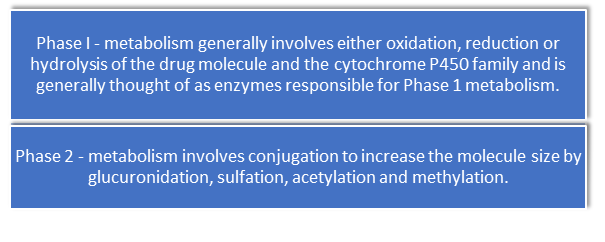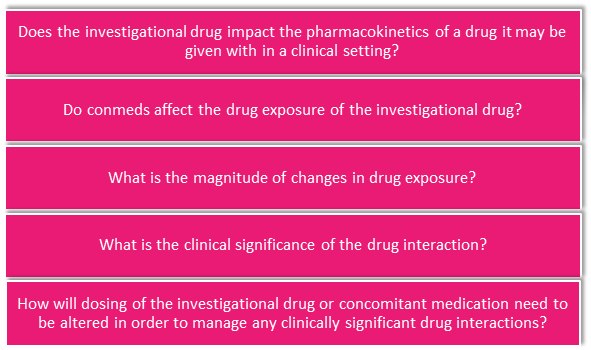Metabolism
Why do we want to understand metabolism?
With the rise in polypharmacy it has become important to understand how concomitantly administered drugs will impact each other’s exposure and thus safety and efficacy. In the context of drug development.
Metabolism Overview
Drugs are metabolized by the body in order to make them easier to be excreted. Typically, metabolizing enzymes increase the polarity of the drug thereby it is more easily removed in urine and feces. For most small molecules, the gut and liver are major sites of drug metabolism. In vitro studies can help us to understand the role that enzymes play in metabolizing the investigational drug, what enzymes are inhibited or induced by the investigational drug and whether the drug is a substrate or inhibitor of transporters.

Do We Need a Clinical Drug Interaction Study?
Understanding whether an investigational drug has a potential to interact with other medication based on in vitro data can inform whether further clinical drug interaction studies are necessary. Here are a few questions that may guide the need for a clinical drug interaction study:

Metabolite Drug Interaction Considerations
Some metabolites may also exhibit or comprise a significant exposure in plasma and therefore the drug interaction potential of metabolites may be of clinical concern and need to be evaluated.
Evaluation of drug interaction potential is critical in a drug development program. Scientists at PK consultancy have expertise in providing gap analyses and guiding drug development programs from IND to NDA stages. Contact us if you would like to discuss your development program.
References
- https://www.fda.gov/regulatory-information/search-fda-guidance-documents/vitro-drug-interaction-studies-cytochrome-p450-enzyme-and-transporter-mediated-drug-interactions
- https://www.fda.gov/regulatory-information/search-fda-guidance-documents/clinical-drug-interaction-studies-cytochrome-p450-enzyme-and-transporter-mediated-drug-interactions




